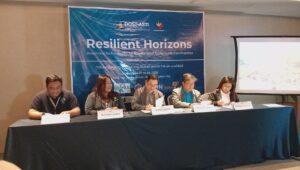The Department of Science and Technology (DOST) on Wednesday signed an agreement for the technology transfer of a digital learning solution aimed at helping students in disadvantaged areas gain access to the internet and learning materials.
The initiative, called the Resilient Education Information Infrastructure for the New Normal (REIINN), was developed by the DOST–Advanced Science and Technology Institute (DOST–ASTI), while its mass production and distribution will be led by Jassen Harris Industries Corp. (JHIC).
The agreement was formalized through a Limited Manufacturing Licensing Agreement signed during the Handa Pilipinas–Visayas leg held in Bacolod City.
REINN project leader Philip A. Martinez said the technology has two components: LokalFi, a community WiFi infrastructure that can be installed in last-mile communities to enhance signal strength, allowing facilities in need, such as schools, to gain access to the internet.
The other component is the RuralCasting (RCast), a technology that uses digital television signals to deliver educational content to remote communities with limited or no internet access.
RCast can come in the form of a digital television box or a dongle with embedded learning materials such as modules and videos, which can be projected onto a TV screen or a projector.
It also includes a built-in learning management system that lets teachers upload modules offline, deliver lessons to students, and manage activities such as quizzes and grading.
“The DepEd has been producing educational videos, but these do not reach schools in the last mile,” Mr. Martinez said during a press conference at the signing event.
“By creating an internet and internet-based solution for delivering educational content, we provide additional value to schools so they can compete with those in highly urbanized areas.”
Household internet access in the Philippines reached 48.8% in 2024, according to the National Information and Communications Technology Household Survey, marking a 31.1%‑point increase from 17.7% in 2019.
This figure refers to internet connections generally available for use by all members of the household, based on a nationwide survey of more than 44,000 households.
Meanwhile, the project leader said that RCAST’s learning materials cover Grades 1 to 12 and are aligned with the current MATATAG curriculum.
Since its initiation in 2021, REINN has served at least 20,000 students across twelve schools and one community center where the technology was installed, Mr. Martinez said.
Although the initiative is currently limited to Luzon due to logistical challenges, it is expected to expand to the Visayas and Mindanao by next year, he said. — Edg Adrian A. Eva
DOST officials at the signing event at the Handa Pilipinas-Visayas leg in Bacolod City on October 29. — Edg Adrian A. Eva

